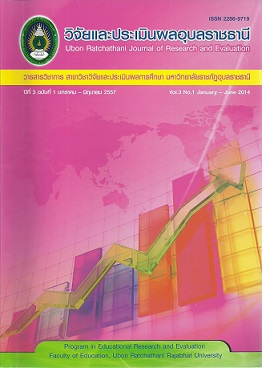การปฏิบัติการพัฒนาทักษะพื้นฐานทางคณิตศาสตร์ที่ได้รับการจัดกิจกรรมเกมการศึกษา ของเด็กปฐมวัยชั้นอนุบาลปีที่ 2 โรงเรียนบ้านนกเต็น สำนักงานเขตพื้นที่การศึกษาประถมศึกษาอุบลราชธานี เขต 3 30-38
คำสำคัญ:
ทักษะพื้นฐานทางคณิตศาสตร์, กิจกรรมเกมการศึกษา, กิจกรรมตามคู่มือครู, การวิจัยปฏิบัติการบทคัดย่อ
การวิจัยครั้งนี้มีวัตถุประสงค์ 1) เพื่อปฏิบัติการพัฒนาทักษะพื้นฐานทางคณิตศาสตร์ที่ได้รับการจัดกิจกรรมเกมการศึกษา 2) เพื่อเปรียบเทียบผลการพัฒนาทักษะพื้นฐานทางคณิตศาสตร์ที่ได้รับการจัดกิจกรรมเกมการศึกษาหลังเรียนกับเกณฑ์ที่ตั้งไว้ร้อยละ 80 และ 3) เพื่อเปรียบเทียบผลการพัฒนาทักษะพื้นฐานทางคณิตศาสตร์ของกลุ่มทดลองที่ได้รับการจัดกิจกรรมเกมการศึกษากับกลุ่มควบคุมที่ได้รับการจัดกิจกรรมตามคู่มือครู ตัวอย่างที่ใช้ในการวิจัย ได้แก่ กลุ่มทดลองเด็กปฐมวัยชั้นอนุบาลปีที่ 2/2 จำนวน 18 คน และกลุ่มควบคุมเด็กปฐมวัยชั้นอนุบาลปีที่ 2/1 จำนวน 18 คน โรงเรียนบ้านนกเต็น สำนักงานเขตพื้นที่การศึกษาประถมศึกษาอุบลราชธานี เขต 3 ภาคเรียนที่ 1 ปีการศึกษา 2556 ได้มาโดยการเลือกแบบเจาะจง เครื่องมือที่ใช้ในการวิจัย แบ่งเป็น 2 ประเภท คือ (1) เครื่องมือที่ใช้ในการทดลอง คือ แผนการจัดประสบการณ์ที่ใช้การจัดกิจกรรมเกมการศึกษาเพื่อพัฒนาทักษะพื้นฐานทางคณิตศาสตร์ จำนวน
20 แผน และเกมการศึกษาเพื่อพัฒนาทักษะพื้นฐานทางคณิตศาสตร์ จำนวน 20 เกม (2) เครื่องมือที่ใช้ในการเก็บรวบรวมข้อมูล ได้แก่ แบบทดสอบย่อยท้ายวงจรปฏิบัติการ แบบทดสอบวัดทักษะพื้นฐานทางคณิตศาสตร์ ซึ่งมีค่าความยากอยู่ระหว่าง .30 - .75 ค่าอำนาจจำแนกอยู่ระหว่าง .20 - .90 และค่าความเชื่อมั่น เท่ากับ .93 แบบสังเกตพฤติกรรมการเล่นเกมการศึกษา แบบสังเกตพฤติกรรมการเรียนของเด็กปฐมวัย แบบสังเกตพฤติกรรมการสอนของครู และแบบบันทึกประจำวันของครูผู้วิจัย สถิติที่ใช้ในการวิจัย ได้แก่ ค่าเฉลี่ย ร้อยละ ส่วนเบี่ยงเบนมาตรฐาน ลำดับพิสัย Willcoxon ทดสอบก่อนเรียนและหลังเรียน และ Mann - Whitney U ทดสอบสองกลุ่ม คือ กลุ่มทดลองและกลุ่มควบคุม
ผลการวิจัยพบว่า
- การพัฒนาทักษะพื้นฐานทางคณิตศาสตร์ที่ได้รับการจัดกิจกรรมเกมการศึกษาของเด็กปฐมวัยชั้นอนุบาลปีที่ 2 โดยผ่านกระบวนการวิจัยปฏิบัติการ 4 วงจร ได้แก่ วงจรปฏิบัติการที่ 1 แผนการจัดประสบการณ์ที่ 1-5 ใช้เกมภาพตัดต่อ วงจรปฏิบัติการที่ 2 แผนการจัดประสบการณ์ที่ 6-10 ใช้เกมจับคู่ภาพกับจำนวน วงจรปฏิบัติการที่ 3 แผนการจัดประสบการณ์ที่ 11-15 ใช้เกมสังเกตรายละเอียดของภาพ และวงจรปฏิบัติการที่ 4 แผนการจัดประสบการณ์ที่ 16-20 ใช้เกมพื้นฐานการบวกภาพ แล้วปฏิบัติการจัดประสบการณ์เรียนรู้ เก็บรวบรวมข้อมูล นำมาวิเคราะห์ข้อดี
และข้อบกพร่องเพื่อเป็นแนวทางในการพัฒนาและปรับปรุงผลการปฏิบัติการ จัดกิจกรรมการเรียนรู้ 3 ขั้นตอน คือ 1) ขั้นนำ เป็นขั้นที่เตรียมความพร้อมก่อนเรียนรู้โดยการร้องเพลงที่สอดคล้องกับคณิตศาสตร์ 2) ขั้นสอน ปฏิบัติกิจกรรม และสังเกต เป็นขั้นที่ครูอธิบายกติกาการเล่นเกม เด็กปฏิบัติกิจกรรมการเล่นเกมที่เกี่ยวกับการพัฒนาทักษะพื้นฐานทางคณิตศาสตร์ และการสังเกตพฤติกรรม และ 3) ขั้นสรุปบทเรียน เป็นขั้นที่ใช้เพลงสรุปเนื้อหา เก็บเกมเข้าที่ให้เรียบร้อย และประเมินผลการทำงานกลุ่ม
- ผลการพัฒนาทักษะพื้นฐานทางคณิตศาสตร์ที่ได้รับการจัดกิจกรรมเกมการศึกษาของเด็กปฐมวัยชั้นอนุบาลปีที่ 2 ผลปรากฏว่า เด็กปฐมวัยมีทักษะพื้นฐานทางคณิตศาสตร์หลังปฏิบัติการเฉลี่ยร้อยละ 94.72 มีเด็กปฐมวัยผ่านเกณฑ์ที่กำหนดร้อยละ 100 ซึ่งสูงกว่าเกณฑ์ที่กำหนดไว้ คือ เด็กปฐมวัยไม่น้อยกว่าร้อยละ 80 ของจำนวนเด็กปฐมวัยทั้งหมดที่มีคะแนนของการทดสอบวัดทักษะพื้นฐานทางคณิตศาสตร์ผ่านเกณฑ์ร้อยละ 80 ของคะแนนเต็ม และผลการทดสอบความแตกต่างระหว่างคะแนนก่อนและหลังปฏิบัติการ Z เท่ากับ 3.76 แสดงให้เห็นว่า เด็กปฐมวัยมีผลการทดสอบทักษะพื้นฐานทางคณิตศาสตร์หลังการพัฒนาสูงกว่าก่อนการพัฒนาแตกต่างกันอย่างมีนัยสำคัญทางสถิติที่ระดับ .01
- 3. การเปรียบเทียบทักษะพื้นฐานทางคณิตศาสตร์ของเด็กปฐมวัยระหว่างกลุ่มทดลองและกลุ่มควบคุม พบว่า เด็กปฐมวัยกลุ่มทดลองและกลุ่มควบคุมมีคะแนนเฉลี่ยร้อยละ 72 และ 69.44 ตามลำดับ มีผลการทดสอบความแตกต่าง Z เท่ากับ 5.12 แสดงให้เห็นว่า เด็กปฐมวัยกลุ่มทดลองที่ได้รับการจัดกิจกรรมเกมการศึกษา มีผลการพัฒนาทักษะพื้นฐานทางคณิตศาสตร์สูงกว่ากลุ่มควบคุมที่ได้รับการจัดกิจกรรมตามคู่มือครู อย่างมีนัยสำคัญทางสถิติที่ระดับ .01
เอกสารอ้างอิง
คุรุสภาลาดพร้าว, 2542.
ดารุณี ชนะกาญจน์. การพัฒนาความพร้อมทางคณิตศาสตร์ของเด็กอนุบาลโดยใช้เกมการศึกษาและแบบฝึกหัด. วิทยานิพนธ์ศึกษาศาสตรมหาบัณฑิต มหาวิทยาลัยเชียงใหม่, 2547.
ธีรวุฒิ เอกะกุล. การวิจัยปฏิบัติการ. พิมพ์ครั้งที่ 3. อุบลราชธานี : ยงสวัสดิ์อินเตอร์กรุ๊ป, 2553
นิตยา ประพฤติกิจ. คณิตศาสตร์สำหรับเด็กปฐมวัย. กรุงเทพฯ : โอ.เอส.พริ้นติ้งเฮ้าส์, 2541.
บุญเยี่ยม จิตรดอน. การจัดประสบการณ์เพื่อสร้างมโนคติทางคณิตศาสตร์ในเอกสารการสอนชุดวิชาการสร้างเสริมประสบการณ์ชีวิตระดับปฐมวัยศึกษา หน่วยที่ 1-7. กรุงเทพฯ : คณะศึกษาศาสตร์ มหาวิทยาลัยสุโขทัยธรรมาธิราช, 2546.
ปณิชา มโนสิทธยากร. ทักษะพื้นฐานคณิตศาสตร์ของเด็กปฐมวัยที่เล่นเกมการศึกษาเน้นเศษส่วนของรูปเรขาคณิต. ปริญญานิพนธ์การศึกษามหาบัณฑิต มหาวิทยาลัยศรีนครินทรวิโรฒ, 2553.
พิจิตรา เกษประดิษฐ์. ทักษะพื้นฐานทางคณิตศาสตร์ของเด็กปฐมวัยที่ได้รับการจัดกิจกรรมศิลปะสร้างสรรค์ด้วยขนมอบ. ปริญญานิพนธ์การศึกษามหาบัณฑิต มหาวิทยาลัยศรีนครินทรวิโรฒ, 2552.
วาโร เพ็งสวัสดิ์. การวิจัยทางการศึกษาปฐมวัย. สกลนคร : โปรแกรมวิชาการวัดผลการศึกษา คณะครุศาสตร์ สถาบันราชภัฏสกลนคร, 2542.
สรรพมงคล จันทร์ด้ง. การเปรียบเทียบทักษะทางคณิตศาสตร์ของเด็กปฐมวัยที่ได้รับการจัดประสบการณ์ทางคณิตศาสตร์ ด้วยโปรแกรมคอมพิวเตอร์ช่วยสอนทางคณิตศาสตร์แบบรายคู่และแบบรายบุคคล. ปริญญานิพนธ์การศึกษามหาบัณฑิต มหาวิทยาลัยศรีนครินทรวิโรฒ, 2544.
สิริมา ภิญโญอนันตพงษ์. การวัดและประเมินแนวใหม่ : เด็กปฐมวัย. กรุงเทพฯ : คณะศึกษาศาสตร์ มหาวิทยาลัยศรีนครินทรวิโรฒ, 2545.
ดาวน์โหลด
เผยแพร่แล้ว
รูปแบบการอ้างอิง
ฉบับ
ประเภทบทความ
สัญญาอนุญาต
1. บทความที่ตีพิมพ์ในวารสารนี้ได้มีการตรวจสอบการลอกเลียนงานวรรณกรรมแล้ว ไม่เกินร้อยละ 25
2. บทความที่ตีพิมพ์ในวารสารนี้เป็นข้อคิดเห็น ข้อค้นพบของผู้เขียนบทความ โดยผู้เขียนบทความต้องเป็นผู้รับผิดชอบต่อผลทางกฎหมายใด ๆ ที่อาจเกิดขึ้นจากบทความนั้น ๆ
3. บทความ ข้อมูล เนื้อหา รูปภาพ ฯลฯ ที่ได้รับการตีพิมพ์ในวารสารวิจัยและประเมินผลอุบลราชธานี ถือเป็นลิขสิทธิ์ของวารสารวิจัยและประเมินผลอุบลราชธานี หากบุคคลหรือหน่วยงานใดต้องการนำทั้งหมดไปเผยแพร่ต่อหรือเพื่อกระทำการใดๆ จะต้องได้รับอนุญาตเป็นลายลักษณ์อักษรจากวารสารวิจัยและประเมินผลอุบลราชธานีก่อนเท่านั้น และจะต้องมีการอ้างอิงวารสารวิจัยและประเมินผลอุบลราชธานี ฉบับนั้น ๆ ด้วย






